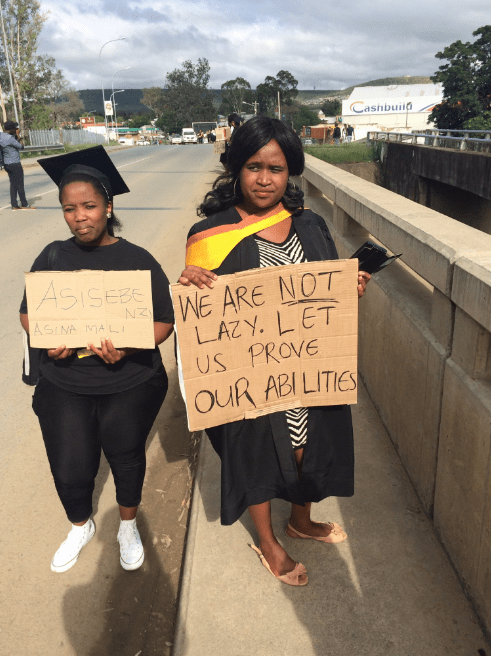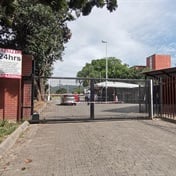
With spiralling unemployment, what hope is there for the country’s young people? Zamayirha Peter finds out
By 2029, there will be more than 6.3 million unemployed young people in South Africa – 1 million more than there are right now – if creative ways are not found to put them to work.
This is one of the findings in research conducted by the Mapungubwe Institute for Strategic Reflection.
The think-tank’s research on youth unemployment, titled The Relationship Between Youth and Work, formed part of its Indlulamithi South Africa Scenarios 2030 project.
The research also found that, of the 1.228 million entry-level jobs that became available last year – either through attrition or the creation of new positions – only 500 000 were filled by young people.
The businesses creating the most jobs for youngsters are in the retail and wholesale sector.
Dr Beth Vale, the lead researcher of the study conducted in partnership with the Harambee Youth Employment Accelerator, said the study also found glaring differences in employment concerns among young people of different economic classes.
“We looked at three different groups for our research. First, we looked into a focus group of job-seeking youth, specifically at women and mainly from rural areas,” said Vale.
“They spoke largely about the vulnerability of young people who are unemployed, saying they were more likely to fall victim to human trafficking [being lured to a big city under false pretences and forced into prostitution or other jobs under slave-like conditions].
“They also found the pursuit of jobs to be expensive – finding information, money to travel to the interview, a means to print your CV, formal clothes to wear and other issues.”
The second group, Vale said, was interviewed in an online chat room with “slightly well-off” participants.
“They spoke largely of optimism for the future. They had concerns about the cost of living, which is often impacted by the economy.”
The final group “was what we could reflect upon as being the future of this country – young people who were leading in their respective fields and were artists, economists and human rights activists who spoke largely as grounded voices who were future-orientated”.
“They also realised that what separated them from unemployed youth was luck and access to employment. And they realised that even the poor and unemployed were as competent and skilled as they are.”
What all groups had in common was “a sense of worry about leadership, employment and corruption”.
“We have a big working age population and it’s likely to keep growing. Existing places of employment are slowly not being capacitated to employ more people,” Vale said, adding that there was a need to find more innovative ways to create jobs for youngsters.
“Many young people are disillusioned by the pathway of going to school and getting an internship in the hope of being employed. There are many graduates who are unemployed. A lot of them are often left within that cycle and are looking for support for avenues they are creating themselves,” Vale said.
“We need to think differently about unemployment. Dealing with unemployment isn’t simply about providing connections or opportunities to work. The future of work and the idea around a nine-to-five job is changing,” Vale said.
The young people interviewed in December felt the country needed to focus more on labour-intensive job creation than on new technology, and that employment was a higher priority than economic growth.
Also, university education was not seen as a priority because of the number of unemployed graduates without skills to join the workforce.
The discourse around land did not feature as prominently as expected.
The study also reflected a high reliance on the state, which was considered to be the source of the country’s problems, and an overreliance on government to deliver structural, material and political “liberation”.
Citizens were seen as having turned into “clients rather than participants in development”.
GRADUATED BUT UNEMPLOYED
Keoagile Matseke (26) from Soshanguve, near Pretoria, has a BCom accounting degree from Wits University, but no job.
He believes university education provides knowledge, but not enough preparation for the world of work.
For him, Youth Month has little meaning.
“I come from a home where I have both my parents and an older sister. My mum is a teacher and my dad works for the municipality,” he said.
“I learnt about universities from my cousin, who told me my marks would qualify me. I got a scholarship in my first year and registered for accounting,” he said.
Matseke has been trying to find a job since he graduated last year.
“It’s a struggle for many of us to get jobs, and I was comforted after realising I was not the only one,” he said.
“There are not enough jobs to meet the demand. Many young people are qualified, but there aren’t job opportunities, and I think this is a cause of a stagnant economy.
“The skills from university make you informed, but not skilled enough to join the workforce. I have joined the family farming business while I wait for responses to my applications.”
Matseke said a lot of work needed to be done to help youngsters enter the workforce.
“I want to see more youth in the manufacturing industry. The government needs to be more efficient,” he said.
“But we also need to be accountable and responsible. We have time to drink, but very little time for finding collective solutions to the many problems we cite online.”
I MADE MY OWN JOB
Mohau Ntabanyane (27), from Vosloorus, east of Johannesburg, said unemployment was the best thing that happened to him.
“It was my experience of unemployment and my inability to finish my short courses that enthused me about starting my own business,” he said.
Ntabanyane, who studied electrical engineering at a Further Education and Training college and did not have money to complete his qualification, is now a fashion designer and sells ties and eveningwear.
His mother works as a dressmaker, and his stepfather was retrenched almost two years ago.
“Growing up, I was reminded every day by the situation at home, in my community, and in South Africa as a whole, that I wanted a much better life for myself and the ones beside me,” he said.
He was always told that education was the key to success, but he says the system failed him.
“It is 100% nonsense. Most of the things we learnt were very impractical. I always felt a disconnection with what was going on around me and what I had to learn,” he said.
Ntabanyane believes South Africa’s young people are in “big trouble”.
“A lot of the young people do not have any creative skills. There isn’t any formal platform that can sharpen their creative skills or talents, and it is the skills that pay the bills,” he said.
“Youngsters have to depend on employment to have any economic participation, yet the rate of unemployment is consistently high.”
Ntabanyane believes more young people in Parliament would help the situation.
“Young people need an organisation that is similar to AfriForum, which is well resourced and unrelenting in its representation of those it represents,” he said.
HOW I ESCAPED THE RURAL POVERTY GAP
Today, he’s a lecturer and researcher at Wits University with a master’s degree in economics. But for Mzwanele Ntshwanti (25), from the village of Zingqayi, 30km away from the Eastern Cape town of Gcuwa, the odds seemed stacked against him.
“I’m the last born of five. My parents separated when I was 15. My mum has always been a housewife. My brother and I had to sell sweets at school to pay for our transport,” he said.
“My gut feeling told me that there must be a better life. I was a forward child and focused on my academics.”
Ntshwanti said he realised he couldn’t allow poverty to define him.
“My reality was nothing I had created for myself, but something I was born into, and I had to define the reality I wanted to see and create it. I hate poverty. It relegates people to a subclass.”
Ntshwanti secured a loan from the National Student Financial Aid Scheme and a bursary from Old Mutual, and enrolled at Wits University.
“I wish young people did more, fought boundaries and really pushed themselves to eradicate poverty and define the future they want. I am disappointed in young South Africans. Our conversations need to change and our actions need to speak louder. We have to grab opportunities and run with them,” he said.
Young people like Ntshwanti have an additional burden to bear – supporting their unemployed extended families.
“Black tax is painful. The government isn’t doing anything at all to protect young people from so much tax. While I see black tax as necessary, I don’t think it’s an obligation. I always work towards cutting the dependency attitude with my family and creating a space for everyone to do their own work and survive,” he said.
“Young people must not entertain black tax. It’s emotionally and financially draining. We must quickly find means for the poor generation to survive in a way that doesn’t tax our progress. If we don’t, we run the risk of being trapped in a poverty cycle.”
I’M SO GRATEFUL FOR MY JOB
Tshepo Twala (25), who graduated with a degree in law from the University of the Western Cape, is relieved to have landed a job at a large corporate law firm.
Born in Daantjie Village, outside Mbombela in Mpumalanga, he was raised by his mother and grandmother.
“My biological mother ensured my brother and I went to bed with something in our stomachs. She has been mother and father to me,” he said.
“I had an awesome childhood. I enjoyed the township life because I believe it prepared me for the journey that was to come.”
Twala “understood from a very young age that life is a process full of endless opportunities in which I could be anything I wanted to be as long as I put my mind and soul into it”.
“I understood that nothing in life came easily. One has to work hard. I understood that there is so much more to life than money. I knew growing up that I was already rich because of my family,” he said.
“I understood that I was in control of my own future and that I am my own person who needed to develop his own way of life, free of negative influences.”
Today, he is an associate at Bowmans.
“Working in corporate South Africa has always been a big motivator throughout my life, and I will forever be indebted to Bowmans for giving a young black kid from the dusty roads of Mpumalanga an opportunity to learn and develop in the legal profession,” he said.
“I knew that, if I could make it, people from townships would start believing that nothing’s impossible.”
He conceded that corporate South Africa had problems, including a lack of transformation and pay inequality.
“Being in a corporate environment is not easy. It requires discipline, dedication, a strong mind-set, self-belief, a thinker, a person who thinks on his or her feet, sacrifices, a person who is willing to learn new things and a person who is willing to be taught,” he said.
“The downside of all this may be the fact that you spend a lot of hours at the office, but I do not mind that because I am doing work I love and I am developing my career.”
For Twala, Youth Month is an opportunity to “remind ourselves of the sacrifices that were made for us as the youth of today to be within the spaces we are in”.
“It is a month to look past our differences, and see the value and worth we bring to South Africa as the youth.”




 Publications
Publications
 Partners
Partners








